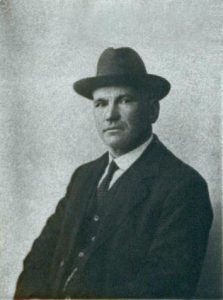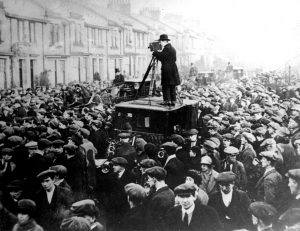
Scott 4770
 In my ongoing quest of postage stamps relating to Scotland, I stumbled upon this enigmatic russian stamp issued in 1979 to commemorate the 100th birth anniversary of John Maclean, a Scottish schoolteacher and revolutionary socialist of the Red Clydeside era.
In my ongoing quest of postage stamps relating to Scotland, I stumbled upon this enigmatic russian stamp issued in 1979 to commemorate the 100th birth anniversary of John Maclean, a Scottish schoolteacher and revolutionary socialist of the Red Clydeside era.
I googled his name and discovered that he was born in Pollokshaws, on the southern outskirts of Glasgow, from parents originally from the Highlands. He attended the University of Glasgow where he met James Maxton who shared his socialist outlook. This led John Maclean to speak out his own views to what he believed to be ‘a war of imperialism which divided workers from one another’.
In 1915 a group of Scottish socialists, including Maclean, Willie Gallacher, John Muir, David Kirkwood, and John MacLean, formed the Clyde Workers’ Committee, an independent organisation of the rank and file. The CWC attempted to confront Government demands over dilution and conscription.
Maclean produced a journal called The Vanguard where he campaigned against the First World War. Maclean and James Maxton were both arrested and charged with sedition under the terms of the Defence of the Realm Act. Found guilty, the men served over a year in prison. The Govan School Board sacked Maclean from his teaching post at Lorne Street School.
Because of his views, Maclean was briefly arrested in October 1915 under the Defence of the Realm Act. He was also fired from his post as a schoolteacher in Govan.
Source: Spartacus
The freedom of speech was his main mantra as you can read in this extract from speech delivered during his trial for sedition at the High Court in Edinburgh.
« (…) I wish no harm to any human being, but I, as one man, am going to exercise my freedom of speech. No human being on the face of the earth, no government is going to take from me my right to speak, my right to protest against wrong, my right to do everything that is for the benefit of mankind. I am not here, then, as the accused; I am here as the accuser of capitalism dripping with blood from head to foot.(…) » John Maclean’s speech from the dock has also been published online, with introduction and afterword by Terry Brotherstone, on the People and Nature blog.
‘Maclean was arrested again in February 1916 after making a series of anti-conscription speeches and charged with six separate offences of sedition. In April 1916 he was imprisoned for three years, but released on 30 June 1917 following a public campaign against his imprisonment, which had gathered pace after the February Revolution in Russia.
In January 1918 Maclean was elected to the chair of the Third All-Russian Congress of Soviets, and the following month he was appointed Bolshevik consul in Scotland. The consulate he established at 12 Portland Street in Glasgow was not recognised by the British Government.
On 15th April 1918, Maclean was again arrested for sedition. He was refused bail and his trial fixed for 9th May in Edinburgh. He conducted his own defence.

Following the armistice he was released from prison on 3rd December 1918. Maclean formed the Tramp Trust Unlimited in 1919, an organisation that campaigned for a minimum wage, a six-hour day and full wages for the unemployed.
Maclean had emerged from Peterhead prison in 1918 in poor health, after several months on hunger strike during which he was force fed, and his imprisonment in 1921/2 weakened him further.
Former comrades in the Socialist Labour Party such as Arthur McManus, Willie Gallacher, Tom Bell and Willie Paul, formed the Communist Party of Great Britain. Maclean refused to join as he believed that workers in Scotland could develop into a revolutionary force before those in England and Wales.
Maclean instead formed the Scottish Workers Republican Party (SWRP) which combined communism with a belief in Scottish independence.
He died in 1923 at the age of 44, and 20,000 people lined the streets at his funeral. Today his political legacy is claimed by the Scottish Socialist Party, though he also paved the way for many Scottish Nationalists who followed. John Maclean was later the subject of a poem written by Hugh MacDiarmid, and has also featured in a number of songs. During the Soviet era a street, Maklin Prospekt, in Leningrad was named after Maclean.’ [See source links below]
Peterhead Prison
 ‘Peterhead, or the Blue Toon as it is affectionately known locally, is the largest town in Aberdeenshire and known as a premier fishing port also providing a major support centre to the North Sea oil and gas industry. In the town centre you will find stores and national chains alongside a range of cafes and restaurants.’
‘Peterhead, or the Blue Toon as it is affectionately known locally, is the largest town in Aberdeenshire and known as a premier fishing port also providing a major support centre to the North Sea oil and gas industry. In the town centre you will find stores and national chains alongside a range of cafes and restaurants.’
 From 1888 to 2013, the town of Peterhead, located at the most easterly point on the mainland, surrounded by stunning sandy beaches and magnificent coastlines housed the Victorian-built prison where John Maclean was imprisoned.
From 1888 to 2013, the town of Peterhead, located at the most easterly point on the mainland, surrounded by stunning sandy beaches and magnificent coastlines housed the Victorian-built prison where John Maclean was imprisoned.
The doors were closed in 2013 and the building was saved from demolition by people gathering around the idea of transforming the prison into a museum. The idea attracted like-minded people and since June 2016 it operates as the Peterhead Prison Museum.
George R Mitchell has written in The Press and Journal about his visit to the museum. His article brings to life daily routines carried on within a real prison. I find it horrifying that people be treated like this without any human dignity, guilty of a crime or not!
Janice
Sources
Undiscovered Scotland
Spartacus Educational
RS21
People and Nature
The Press and Journal
Wikipedia
PS: Only two Scottish personalities were featured on the postage stamps of the Soviet Union: John Maclean and Robert Burns.

Scott 1861
 Scott 2174
Scott 2174


Leave a Reply